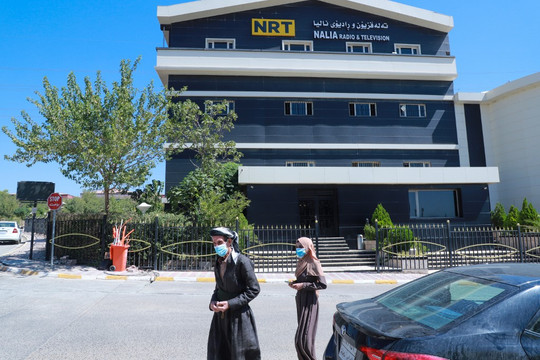Before dawn on 7 December, local security forces from Iraqi Kurdistan interrupted NRT’s live broadcast from its bureau in Sulaimaniyah, a city located in the east of the Kurdistan region of Iraq, not far from the border with Iran, taking it off air and confiscating some of its equipment as part of a process of shutting them down for a week following a government order.
In a statement, NRT explained the causes behind its ban were alleged non-compliance with the guidelines of audio and visual media and the network’s “irresponsible behavior during the current time”. Despite the broadcast blockade, from 11:30 a.m. on Monday 7 December to 11:30 a.m. on Sunday 13 December, NRT’s website wasn’t affected, allowing them to publish photographs of the military vehicles parked outside their headquarters.
NRT has been covering the protests that began on Wednesday at the Sulaimani Governorate over the deterioration of economic conditions, the payment of public sector salaries and the lack of basic services.
The network is owned by Shaswar Abdulwahid, a businessman and politician who lead the ‘No for now’ campaign against the KRG referendum on independence in September 2017. Four months later, he founded the New Generation Movement, also known as ‘Naway Nwe’, to participate in the general elections of 2018. The party won four seats in Iraq’s Council of Representatives in May.
This is not the first time that NRT has faced a blockade from the Iraqi Kurdistan authorities. In August, KRG shut down their offices in Erbil and Duhok for one month in retaliation for covering protests and for airing broadcasts critical of the government. Journalists were banned from reporting and threatened with the seizure of their equipment if they attempted to keep working.
Besides media, media professionals have also suffered. On 22 September, the head of the Mediterranean Institute for Regional Studies and a member of the KJS, Bahroz Jaafer, was arrested after Iraqi president, Barham Salih, filed a defamation lawsuit against him due to an article accusing him of corruption.
The Kurdistan Journalists Syndicate said: "We condemn the behavior of the security forces and call for the annulment of the decision to close down the NRT channel and to comply with the law in its relations with media institutions. In particular, security forces must comply with the articles of Law 35 on journalistic work in the Iraqi Kurdistan region in order to put an end to violations and we call on journalists to work with professionalism”.
IFJ President, Younes Mjahed, said: “Banning media from doing their job only creates more anger and indignation. KRG cannot keep silencing our colleagues’ voices and stop media pluralism. We encourage journalists in Iraqi Kurdistan to maintain their efforts in producing critical journalism. It guarantees democracy!”.

